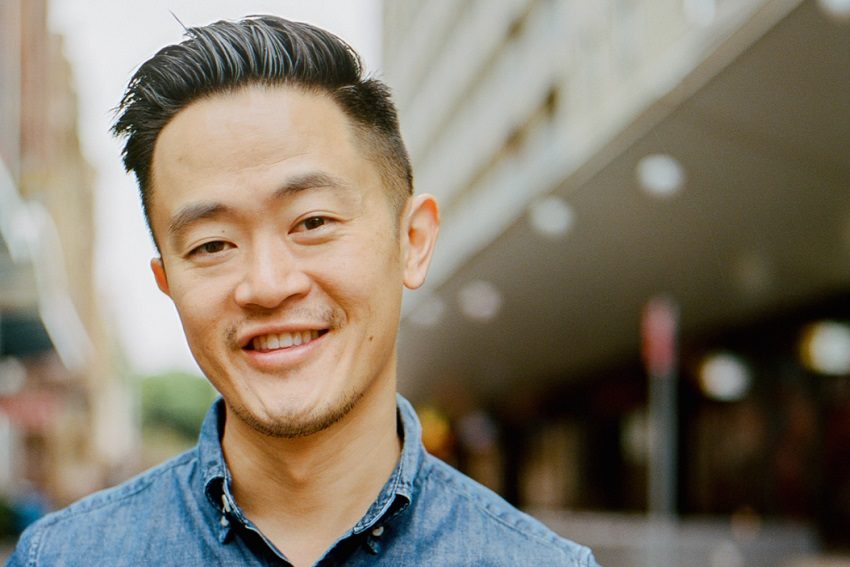Laying down the Law

Australian writer Benjamin Law will speak at the Adelaide Festival of Ideas about two subjects close to his heart.
“I think it’s a Polish saying,” begins Benjamin Law. “When a writer is born a family dies.”
If poet Czesław Milosz was correct, the Laws are in trouble. Law and his sister Michelle are behind two shows currently streaming on SBS On Demand – The Family Law and Homecoming Queens – that feature a good dose of familial inspiration.
Thankfully, the other Laws are happy to get on board. “My mum is one of the extras in Homecoming Queens,” says Law. “She makes a cameo in The Family Law. My whole family makes a cameo in The Family Law… and our sister Tammy was the stills photographer for Homecoming Queens.”
Law has just wrapped shooting the third and final season of The Family Law, his AACTA-nominated series adapted from his best-selling memoir of the same name. Both chronicle Law’s formative years in suburban Queensland.
Ostensibly a comedy, the heartwarming series also touches on those dramatic, intimate and significant moments that come with growing up. “We really want to laugh but we really want that emotional depth,” says Law of the show’s balancing act. “You know, you can only really laugh when you kind of honour the complexities of a situation as well, or the heartache in a situation.”
The final season, which will air in the second half of the year, will centre on a “storyline that we’ve been flagging since episode one,” he says. “I think the audience has always been a step ahead of Benjamin the character in terms of knowing he’s gay. He hasn’t really acknowledged that about himself. This will be the year where things start gelling for him in a good way but sometimes in embarrassing, awkward and horrific ways, which is good comedy.”
Much of it, including one of the pivotal moments of the season, was taken from Law’s own experiences as a teenager. “It’s funny, you know, I came out half a lifetime ago and yet when I watched the scene where Ben comes out to his mum Jenny [based on Law’s own mum Jenny] I started crying,” he says. “So much of that stuff was lifted from real life and the performances and the direction is so exquisite. And I think a lot of Australians will be really moved by it when they see it too, hopefully.”
Law has spoken at length about diversity and representation, or lack thereof, on Australian TV. “For years, I’ve joked that if spotting non-white, non-heterosexual or non-able-bodied people on Australian TV was a drinking game, everyone would stay sober,” he once wrote. So where are we at now?
“We’re getting better … but we’ve been working from such as low base,” he says. “I think for all of our talk about diversity what we’re really talking about is unfair and unwarranted overrepresentation of white people, of able-bodied people and of straight people. And that’s because white, able-bodied, middle-aged men tend to call the shots.
“And I think because Australians have been used to it for so long we don’t tend to question it as much. Or if we do question it everyone accuses people of being politically correct or tokenistic and it’s like, no no no we just want to remedy the fact that we don’t see a lot of Australians on screen. And that’s a problem, especially for young Australians who don’t see themselves represented in the media.”
Law will discuss the notion of ‘the Australian identity’ in Adelaide next month at the Adelaide Festival of Ideas in a session with local street artist Peter Drew and Dr Jennifer Caruso.
He’ll also speak about Safe Schools, the Government-backed national program for LGBTQI kids that became the centre of a media firestorm. “I’ll be doing a session on Why Every Parent Should Be Concerned About Safe Schools But Not for the Reasons You Think…,” he teases.
 Last year Law wrote a Quarterly Essay on the program (at its core, a toolkit for teachers to equip them to provide and promote a safe and inclusive environment for queer students) in response to the media backlash and spread of misinformation – “an attempt at a corrective,” he called it.
Last year Law wrote a Quarterly Essay on the program (at its core, a toolkit for teachers to equip them to provide and promote a safe and inclusive environment for queer students) in response to the media backlash and spread of misinformation – “an attempt at a corrective,” he called it.
“It’s something that’s not really been resolved,” he says now. “It’s now up to individual states to decide whether they want to continue teacher training programs for safe schools.”
When asked how such a program might have impacted his own school experience, Law points out the benefits aren’t limited to LGBTQI-identifying students. “I think it would have impacted me knowing that teachers were self-equipped to support me; that they felt confident knowing how to address kids calling each other ‘faggot’, ‘dyke’, ‘poofter’ in the schoolyard,” he says.
“But that stuff doesn’t just affect queer kids. It affects straight kids as well. I think that’s something we need to reframe our thinking around. Homophobia is not just a niche issue that affects a small part of the population. Homophobia is used in schoolyards to police how boys and girls behave. It’s used to bully and intimidate each other. And it does result in an increase of suicidal behavior in people who question their sexuality and gender or who identify as queer.”
Panel with Benjamin Law, Dr Jennifer Caruso and Peter Drew: ‘When a stranger calls’
Saturday, July 14, 10.30am
Allan Scott Auditorium
Free
Benjamin Law: ‘A 101 on Safe Schools’
Sunday, July 15 2018, 2pm
Allan Scott Auditorium
Free
Adelaide Festival of Ideas
12-15 July
adelaidefestivalofideas.com.au
The Adelaide Review is a media partner of the Adelaide Festival of Ideas.